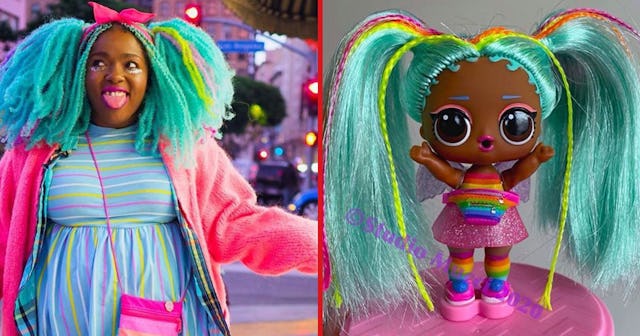Creator Of ‘LOL Surprise Dolls’ Verbally Attacks Black Influencer

In a troubling Twitter rant, MGA Entertainment’s Isaac Larian went in on black influencer Amina Mucciolo
If you weren’t familiar with the name Isaac Larian before, it’s about to be on your radar — and not in a good way. Larian runs MGA Entertainment and is the man responsible for introducing Bratz and L.O.L. Suprise Dolls to the world. But that’s not why he’s making headlines right now. Rather, when influencer Amina Mucciolo accused the company of hijacking her original look for a new doll without her permission, Larian lost it on Twitter. The since-deleted tirade proved problematic, to say the least.
Over the weekend, a few weeks after Mucciolo first took her accusation to Twitter, Larian verbally attacked the content creator. “You are #Disgrace to black people and the #BLM cause. #Liar and #Coward,” the billionaire wrote, continuing, “You are a #LIAR and a #Extortinist [sic] and #Fraud. Who’s your so called lawyer? Put his name and contact information here PUBLICLY now so we can contact him or her. Now we will no longer be nice and will sue you for defamation, extortion, fraud, etc.”
We’ll unpack that more in a minute. But to rewind a bit, MGA introduced its colorful “Rainbow Raver” L.O.L. Surprise Doll last year as part of its “Hair Goals” collection. Not surprisingly, it was first met with enthusiasm by fans. Bright hues pop against the tiny figurine’s perfect brown skin for a toy that’s impossible not to smile over. According to Mucciolo, though, fans started pinging her in late 2019 to point out just how much the doll resembled her.
Speaking to Buzzfeed, the influencer admitted that it shocked her to realize the accuracy of fans’ observations. “The first thing I noticed was the exact replica of a hairstyle I did to celebrate my 35th birthday,” she told the outlet.
She elaborated, “It was aqua with rainbow highlights, and it was shocking because the hairstyle was the result of my imagination and leftover hair I had from the previous style I wore. I didn’t have a visual reference or anything, so it was disturbing to see something that came straight from my mind, to be duplicated on a toy that I had no part in creating.”
https://www.instagram.com/p/CBmFwlypQZ1/
Mucciolo, who wore the hairstyle from November 2018 to February 2019, tried to reach out to MGA before airing her grievance on Instagram. There, she alleged that the company had “created a doll based on my entire image and identity” without her consent or any compensation.
In her post, Mucciolo also revealed that in April 2019, mere months shy of releasing the doll, L.O.L “surprise reached out” to hire her as a guest on their YouTube channel for a children’s interior design show.
MGA responded to Mucciolo’s post on June 10, alleging the doll was developed in the summer of 2018 by “one of our talented black designers, a now success fashion entrepreneur, who has confirmed the doll was not based on Amina Mucciolo.”
Larian even jumped into the fray then, daring to suggest on June 11 that Mucciolo was hurting the cause of Black Lives Matter by using it to “profit and defraud for personal gains.”
Which brings us back around to the present. Three days ago, the influencer informed fans she and her partner were in the process of hiring a lawyer specifically for this situation. Once again, Larian got involved, this time launching his ridiculous tirade calling Mucciolo a “disgrace to black people.”
And, like, where do we even start with this? Maybe here: A non-Black person cannot possibly speak for Black people or an entire Black movement. Never. Ever. It’s race-splaining, and it’s unacceptable.
As for the doll, Larian’s response makes it seem as though Mucciolo’s claims have no merit. For real, bruh? One look at the doll makes it abundantly clear there are undeniable similarities — right down to the placement of the streaks of color in the doll’s ponytails.
And even though Larian issued a pseudo-apology blaming his Twitter tirade on frustration and referring to the “production timeline,” all he is really offering is his word. And in offering his word devoid of any sort of tangible evidence, he’s implying that his word should be given more weight than that of a Black influencer’s.
To that end, Mucciolo brings up one of the most salient points surrounding this entire controversy. “This sort of thing happens to Black creatives more than you could possibly imagine, and we are tired,” she said, admitting that “having huge corporations make money off my ideas and identities, while I struggle financially as a Black freelance artist and content creator, has been both infuriating and devastating, to say the least.”
This type of predatory behavior is, as Mucciolo points out, not uncommon. In fact, Mucciolo has already been down this path once before with Lisa Frank. Last year, when the fluorescent brand launched a Hotels.com-sponsored Lisa Frank suite that looked like a slightly-off carbon copy of her bright and cheerful apartment.
Just as Larian did, Lisa Frank responded to Mucciolo’s claims by turning on her — claiming she was opportunistic and subverting the BLM movement for her own benefit.
These are, disgracefully, far from the only examples of celebrities or large corporations profiting off of Black creativity. Remember in 2017 when NYC-based fashion designer Tizita Balemlay suggested Kylie Jenner debuted camo-kinis that were eerily similar to items in her brand’s collection… after Jenner had purchased from her store?
Tragically, there are likely countless untold stories like Balemlay’s and Mucciolo’s that have yet to come to light.